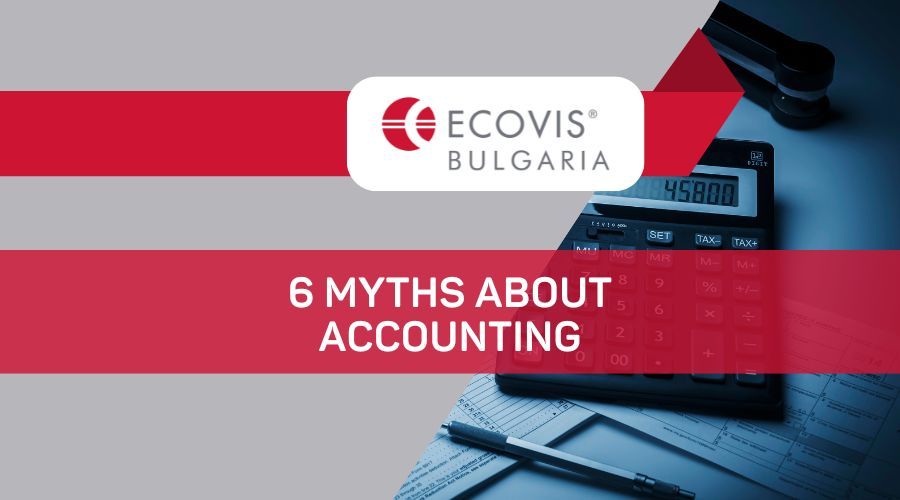
Myths and reality in accounting | Which are the most common?
Ecovis | 29 January 2025
How often do each of us fall into the trap of misconceptions about accounting?
You've probably heard that accountants only fill in tax returns. Or maybe you believe that to be an accountant you have to be a mathematical genius?
Well, we at Ecovis Bulgaria are here to debunk these myths and to reveal to you all the truths about accounting.
If you wish to learn how accounting may change your business and how you can avoid financial mistakes with its help, read to the end.
Myth 1: Accounting is for big businesses only
The truth is that accounting is vital for any type of business, be it small or large.
Regardless of whether you have a large company or a small shop, proper financial management is the key to success. Ignoring accounting is costly and leads to a number of confusions and unsolvable problems.
Small business owners often overlook the need for expert help to perform accounting services. And this is that leads to big financial "shocks" later on.
Accounting helps you keep a close eye on your income and expenses. Without it, you're in a fog. And the chance of finding out if your business is growing and developing is the smallest.
Moreover, the good financial organisation allows you to make informed decisions that lead to secure growth.

A small business that has a clear view of its finances has much greater chance of addressing the market challenges.
Therefore, the business size is irrelevant when it comes to accounting.
Myth 2: Accountants only deal with taxes
Yes, while a good portion of accountants' duties are related to tax returns and tax services, that's not all their job.
Each accountant analyses the enterprise's revenue, expenses, and budgets.
Professional accountants also offer financial projections and help plan for opportunities and obstacles that the business faces.
And last but not least, accountants don't just track numbers.
They have a strategic role. Their insight into your financial situation allows them to offer you solutions on how to optimise your expenses and maximise your profits.
Last but not least, accountants are able to detect "hidden" trends in budgeting. For example, if they notice that your expenses in a particular sector are increasing significantly, they can timely warn you thereof.
This enables you to take action before things get worse.
Myth 3: You have to be a mathematical genius to understand accounting
This myth is quite common. But the reality is quite different.
Accounting does not require sophisticated mathematical skills, but logic and organisation. Think of it like solving a puzzle - when you have the right knowledge, things work out. And the puzzle is easy to sort.
Today, there are numerous programmes and smart tools that simplify complex accounts and processes.
What really remains important and matters is the accountant’s ability to interpret data and to understand how it impacts the business.
Accounting is not a "high flying" kind of job. And accountants do not need to have passed all the units of higher mathematics.
And as mentioned, there are already "smart assistants" that make complex accounts easier. What remains important for experts is the ability to organise information and to manage to weave meaning from it.
Myth 4: Accounting is only about accounting entries and classifying financial transactions
Accounting entries and accounting are interrelated but are distinct processes.
What's the difference, you ask?
Accounting records track every financial "step" you take. Accounting, on the other hand, analyses that data and turns it into useful information for decision making.

If we can put it simply - the accounting entries are the ingredients the chef (accounting) needs to cook his dish.
Both are important. Both are needed to get the full picture.
Let us not forget that accounting involves devising strategies for improvement. Every decision is based on data and is made for the purpose of achieving better financial future for the business.
Myth 5: Profits are equal to cash flow
Having a profit does not automatically mean that you have enough money in the till. Cash flow management is just as important as profit.
On paper, it may look like you have incredible earnings, right? But if payments slow down or expenses rise, you'll find yourself in a bind.
For example, if you have a lot of customers who pay late, this could lead to lack of finance in a given period.
At the same time, regular cash flow monitoring can help you deal with such situations in a timely manner.
Myth 6: You can only manage accounting with the help of an application
Yes, there's no denying that online accounting applications like QuickBooks and others are great helpers. But they can not replace human expertise.
The accountant has experience and knowledge that technology cannot offer.
Automation makes our lives easier, but it does not understand specific business needs like an expert would

The key to success is balance.
In addition, the human factor contributes creativity and strategy. While applications are great for performing mechanical tasks, they cannot offer advice or solutions for solving non-standard problems.
Accounting - a pressing need for businesses
Accounting is the foundation of every successful business.
Believing myths only prevents us from getting the most out of it. Do not underestimate the role of experts. They are the ones who help us organise, analyse, and manage our funds efficiently.
Awareness is the first step to better managing your business. If you wish your business to grow, ignore the myths and trust the expertise.
 Make an inquiry
Make an inquiry